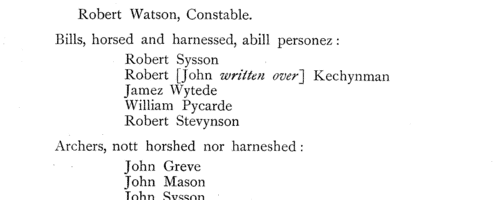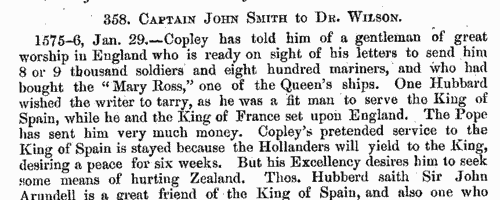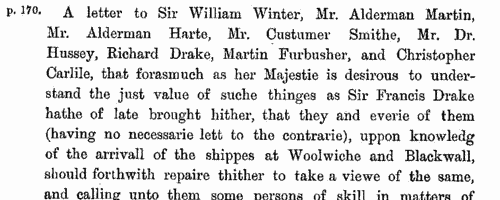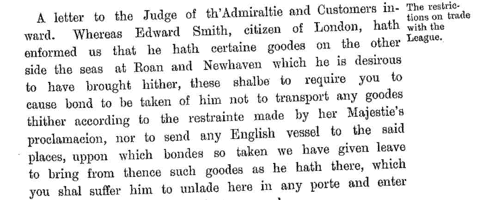Add this eBook to your basket to receive access to all 148 records. Our indexes include entries for the spelling kelk. In the period you have requested, we have the following 148 records (displaying 11 to 20): These sample scans are from the original record. You will get scans of the full pages or articles where the surname you searched for has been found. Your web browser may prevent the sample windows from opening; in this case please change your browser settings to allow pop-up windows from this site. Temple Newton Archers
(1539)
In anticipation of war with France, Henry VIII ordered a general muster of able-bodied men throughout the kingdom. That for the wapentake of Skyrack, in the West Riding of Yorkshire, took place at Wike (near Leeds) before sir William Gascoigne the elder, sir William Middleton and sir William Maleverer, on 26 March 1539. Skyrack wapentake consisted of the ancient parishes of Aberford, Adel, Bardsey, Barwick in Elmet, Bingley, Collingham, Garforth, Guiseley, Harewood, (part of) Ilkley, Kippax, Otley, Swillington and Thorner, as well as the borough of Leeds. This muster roll listing the archers, billmen and spearmen of the wapentake by township or constablewick, was preserved among the State Papers in the Public Record Office; it was edited by W. Paley Baildon, and printed in three issues of the Miscellanea of the Thoresby Society (volumes 4 and 9) through to 1899. For each township there is a list of archers, divided into those fully and those partly ('parcel') armoured ('harnessed'), and a similar list of billmen; a few spearmen also appear. The weapon of the billmen - the bill or halberd - was a blade with a long wooden handle, sometimes with a hook with a cutting edge added at one side. This return includes the hamlets of Halton and Colton.
| Sample scan, click to enlarge

| Tenants, founders and incumbents of Yorkshire chantries
(1546-1548)
Chantries were established to perform services for the souls of their founders and other faithful dead, including annual obits and anniversaries at which alms were usually distributed. The chantries could be at an existing altar in a parish church, a new altar in a side chapel of an existing church, in a new chapel in the churchyard or some miles from an existing church: few were founded before 1300, and most date from 1450 to 1500. Hospitals were places provided by similar foundations to receive the poor and weak; there were also religious guilds, brotherhoods and fraternities, and colleges (like large chantries at which three or more secular priests lived in common). An Act of Parliament of 1545 gave king Henry VIII the power to dissolve such chantries, chapels, &c., the proceeds to be devoted to the expenses of the wars in France and Scotland. Commissioners were appointed 14 February 1546 to survey the chantries and seize their property, and from 1546 to 1548 the commissioners produced these certificates giving brief details of the establishment and nature of each foundation, with an inventory of valuables and rental of lands. The individuals named in the certificates are thus the founder, the present incumbent, and the tenants whose rents provided the chantry's income. All the surviving certificates were edited by William Page for the Surtees Society, and published from 1892. | Sample scan, click to enlarge

| Tradesmen of York
(1272-1558)
No man or woman could trade in the city of York without having obtained 'freedom' of the city.Their names were recorded on the 'Freemen's Roll', or Register of the Freemen of the City of York, which contains about 19,900 names for this period. A list of names was prepared for each year, the year being here reckoned as starting at Michaelmas (29 September) until 1373, and thence at Candlemas (2 February). Each annual list starts with the name of the mayor and the camerarii or chamberlains. The chamberlains were freemen charged with the duty of receiving the fees of the new freemen; of seeing that only freemen traded in the city; and of preparing this roll, which was compiled from the names on their own account books from the receipts for the fees. There are three groups of freemen: those who obtained freedom after serving out an apprenticeship to a freeman; the children of freemen; and those who claimed freedom by 'redemption', i. e. by purchase or gift from the Mayor and Court of Aldermen.
| Sample scan, click to enlarge

| Official Papers
(1547-1580)
The State Papers Domestic cover all manner of business relating to England, Ireland and the colonies, conducted in the office of the Secretary of State as well as other miscellaneous records.
| Sample scan, click to enlarge

| Cecil Manuscripts
(1572-1582)
Letters and papers of William Cecil lord Burghley, Lord Treasurer. Includes some other material as early as 1553. | Sample scan, click to enlarge

| Liegemen and Traitors, Pirates and Spies
(1586-1587)
The Privy Council of queen Elizabeth was responsible for internal security in England and Wales, and dealt with all manner of special and urgent matters
| Sample scan, click to enlarge

| Liegemen and Traitors, Pirates and Spies
(1591)
The Privy Council of queen Elizabeth was responsible for internal security in England and Wales, and dealt with all manner of special and urgent matters
| Sample scan, click to enlarge

| Official Papers
(1611-1618)
The State Papers Domestic cover all manner of business relating to Britain, Ireland and the colonies, conducted in the office of the Secretary of State as well as other miscellaneous records.
| Sample scan, click to enlarge

| Official Papers
(1623)
The State Papers Domestic cover all manner of business relating to Britain, Ireland and the colonies, conducted in the office of the Secretary of State as well as other miscellaneous records. Includes some material from previous years, as early as 1603.
| Sample scan, click to enlarge

| Official Papers
(1651)
The State Papers Domestic cover all manner of business relating to Britain, Ireland and the colonies, conducted by the Council of State, as well as other miscellaneous records. These records are from January to October 1651.
| Sample scan, click to enlarge

|
Research your ancestry, family history, genealogy and one-name study by direct access to original records and archives indexed by surname.
|











